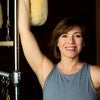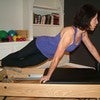Description
Mari Winsor was a pioneer in the Pilates community because of how she made the method accessible to the public. In this inspiring interview, she shares how she started Pilates and opened her studio, and how she went to study with Romana Kryzanowska when she knew she needed more training. She then goes on to discuss her first infomercial, which is the most successful fitness infomercial on TV!
Find out more about ALS and the hope to find a cure by donating to Augie's Quest. All of the proceeds go to ALS research.
About This Video
Transcript
Read Full Transcript
Chapter 1
Starting Pilates and Meeting Romana
Our guest today opened our first studio in 1990 in Los Angeles, California. She went on to study closely with Romana Kryzanowska and in 2003 helped popularize Pilates. When her first infomercial was released, 30 videos later and over 50 million programs sold. People no longer give us that quizzical look when they hear about Pilates. By now, you know I'm speaking about Mari Winsor. Mari is here today to talk about all of that plus share the details of our recent health diagnosis that has everyone in the community in disbelief and concern. Mari is a real treat to have you here today. Thank you so much for coming. Pleasures mine. Ah, well you're very kind.
I mean here by the ocean. What could be better? First of all, I have to acknowledge the fact that I'm nervous and I, I get nervous all the time. But this one in particular, because to my own mind, I've been doing Pilates forever. And I know that's not true because there's so many of you who came before me and you have all those people really made what I am trying to do, much easier. You've made Pilates Anytime possible. And, uh, I thank you for that and I've always wanted to say that and I've always wanted to be on, on your website. So thank you. It was, it's fortuitous. It's, it's awesome. So with that, I'll carry on and, okay. And I think people know you and maybe not everyone knows you as Winsor pilates, Mari Winsor so I want to go back further and just start with, um, how you began. I know that you opened your studio in 1990 in Los Angeles, um, and then you went to work with Romana after that, I believe. Okay. So, so where, how did you come into Pilates at all and how did you meet Romana wow, you got to buy the half an hour. [inaudible] just kidding. Um, of course I was a dancer and my first Love was Alvin Ailey dance company and I went off to New York after college to be an Ailey dancer. Um, and it was a wonderful experience for me. I learned so much and my best friend at that time was Sarita Allen who became, uh, one of the stars of the Ailey company.
And we are still best friends. I had a wonderful dance career. I have a lot of fun. I traveled the world and I ended up in Los Angeles where I didn't think I should be, but you know, that's where I was. And, uh, all of a sudden I, I got a job with Michael Jackson and I was like, oh my God, you have to Michael Jackson. Yeah, I did. [inaudible] I was in the smooth criminal and I was a drunk lady on the balcony with a champagne bottle. Like claim to fame. Right. The drunk lady. But you know, jobs as per dancers, I'm coming go as you know, as you can imagine, you have to audition.
There's usually 900 people at an and so I did that. I did a film with Patrick Swayze called roadhouse. I was a background dancer in the club. You know, as my dance career was winding down, my friends had, you know, if you want some steady work, I teach this method on the side. Then I'm learning from Kathy grant and she's amazing. She was trying to explain this work to me.
This was like 1987 and I said, um, well, I think I know where that equipment is and I bet they know what they're doing. Well, I was writing about one thing and wrong about the other. There was equipment. I found it, but the people were like, you know how sometimes you just fall into a situation, you think, oh, this is great, and you get going. Then you sit down and you take a good cold hard look at what you're dealing with and you're like, uh, that's not going to work. My friend who was at the, at the Pilates studio that I was working at said, well, why don't you open up your own studio? We don't want to be here anymore and we'll follow you wherever you go.
So that prompted me to do it. They gave me a reformer so I didn't have to, I didn't have to put any money out. Um, I put up a partition in my friend's Lottie Burke studio, which is now called the bar method, but it really is a Lottie Burke and um, [inaudible] and I put two reformers in there and that was my start, but I still didn't know anything. All right. I did not know anything. So the question I have is, were you a more business oriented around [inaudible] at this point? I never have professed to be a great business woman, but I'm a good people person and I know how to make people comfortable. And that is as a, as a, in a servant service-oriented business, that's key. So I knew that that would get me by for a while, but I knew that, I still knew I didn't know anything. And there was a rum. Fletcher, uh, had a studio on Luciana down low alleyway and a couple of people who were running it for him and they were gonna move somewhere else.
And I took that space over and, uh, businesses flourish because there weren't that many studios, but I still knew, I didn't know anything, you know, that feeling of the girls come in with bad knees, Ooh, what do I do? So my friend knew that I felt this way and she said, you know, there's this woman named Romana Christen Oscar, and she's coming into town, you should take a lesson with her. And something in my brain went, yes. So I wouldn't have a lesson with her one lesson, but this woman and I just kind of went, oh, okay. I see. I get it. I get it. There's definitely a method to the Amanda's. And so I said to Ramond that that would give her my first morning, but then I think I was 43 at the time. Um, and, um, that I had to learn everything that she could teach me.
So she graciously took me under her wing and we became fast friends and she taught me so much. Oh my gosh. It was an incredible time for me. I loved her so much. Um, she knew that I had, uh, something special, which I, I'll admit to. I know how to make people feel good and make people feel comfortable on top of which having the real work under my belt made me empowered me, made me feel okay. Now I can go work with that person that has bad knees or has a bad back and know what to do. And that made me feel really good. The problem was going back to my studio with all my friends working for me who all really wanted to be actors and didn't really care about [inaudible] and they had their clients. They were fine. I had a successful studio.
We have a lot of celebrities and a lot of agents and a lot of managers and a lot of this and a lot of that. And they're all happy. They're trainers, they're happy, they're happy. I'm not happy. So what do I do to keep my business? What do I do to keep this business and get those people run and bring a fresh pack in? How do I do that? Like right now I can made you want to, I mean I'm thinking it had something to do with Romana and maybe Jay, but what made you want, cause that's a lot, you know, I'm old school. Okay. I mean, I have to tell you, I studied at the Alvin Ailey dance school when it first opened. My teachers were, if some of your dancers, you might know Alvin Ailey was one of my teachers.
Miljard hill was one of my teachers. She was amazing. Even though she threw an occasional chair. Um, we, we, I had amazing ballet teachers and it was really all about the beauty of the technique. And if you have beautiful proper technique, how much better can your dancing be when you learn from a choreographer? Well, of course I feel the same way about pilates. If you have, if you have the right technique, how much more beautiful can you're teaching me? And that mattered to me because I knew that that was going to give me longevity. And I didn't want to be an actress. I wanted to be a pilates teacher. And I thought one day I thought to myself, what?
I want to go to a hair salon and have my hair cut and colored by somebody who really wanted to be a singer. I don't think so. So I kind of phase it was slow, but I phased out and brought in people who are interested in the same thing I was interested in. And uh, when I wrote my first book, it gave me the financial support to be able to take that group of people and put them through the program myself. I paid for everything for them because it was important to me. Can you speak a little bit about Romana specifically, um, starting with your relationship with her. What was your relationship like with Romana? Fun. Fun.
We had fun. I mean, you know how many people that are really close friends? Can you say that? About a hundred percent of the time. It was always fun. She always made you feel good. There was always laughter. Um, there was learning up, there was empowerment. There was stories about Jo and, and the ladies in the studio that followed over the pillow and they pop the champagne every Friday. I mean, there was, there was history. It meant something. And I was determined to, and a few of us are like this, we want to keep that legacy going.
We wanted to keep that flame burning. Romana was, I mean she, the one thing where man and I had in common was our joy of movement. That's what we had. And she knew that I knew how to make people feel comfortable to get them to move, that I had that. Um, and that's what I think drew us together. You looked at her and you knew you had to work. Everyone says that, I can imagine and you know, feeling the energy, but I've never been able to imagine what that actually looks like other than through some pictures that kind of, I think there is. But is it that she would walk in the room and command attention or was it just, she never commanded that she didn't, she just wants you to work, you know, and that was her command and she, she made you feel like, uh, feel that by being encouraging, there was nothing coming from her but love knowledge.
Oh my God. I mean you have to figure, this was a woman that was dancing with George Balanchine when he first started his company. So this woman had not only knowledge of the body, but she worked with amazing t-shirts also. So that instills in you, um, a sense of respect and command for your own life. One time I had a motorcycle accident and I was on, I was in training, it was my intermediate seminar and I was doing my short box and I was doing my hug and I had a motorcycle accident and I have broken eight ribs and they were healed, but I was still stiff and sore from the scar tissue. And she looked, she was, I was just going back a little bit, you know, being very cautious. And she said to me, darling, how long ago was that accident? And I said, um, four months. She said, okay, you ribs her heel, and she maybe arch all the way back. And I was like, so scared. I was like [inaudible]. And then I realized, Oh my God, I just no pain.
And she brought me help me come back up. And I learned two lessons. One not to be so careful. I mean you have to, you have to be intelligent about it. But if there's scar tissue involved, the best thing for scar tissue is to stretch it. And then it goes away and a or gets a lot less than, it's easier to get your range of motion back.
And that was a real important lesson that I learned for Sam from her jumping
Chapter 2
Making the Most Successful Fitness Infomercial
ahead to 2003 there's this infomercial and you can't not watch this infomercial. Well it was on, but you had to go there. Yeah, it was on day in and day out. But, but even then you could have seen it and you still couldn't turn it off, you know, and then you'd order it. And then yours can order it for someone else. And I'm talking about myself here. I want to know how did that come about? And then I have another question because it's dawning on me what year it came out and how much was happening in the pieties industry at that time.
But if you could just start with how is it that you came to create this infomercial or produce the infomercial, the videos, how does that [inaudible] Guthy Renker, I was approached, see what happened was I was approached to do a book back in 1999, I think, or something like that. And it was, um, a book company out of Chicago and they were like, um, oh, we'll give you $10,000 up front and blah, blah, blah, blah. And I thought, this doesn't sound like really very much money for, uh, uh, you know, an advance on the book. And so I was gonna tell them no, but I was thinking, but I really like to write one. And at the time I was working out the, uh, president of William Morris. And so just for everyone else who, that's a talent agency, it wasn't a talent agency and they have a book department. And um, he called me up to make an appointment and you know, the secretary calls, I have Mr freaking on the line for you. I'm like, oh, not freaking Rifkin on the line for you. And I said, oh, okay. So we talked for a minute. And I said, by the way, do you know this book company in Chicago, Blah, blah, blah. He says, what?
What is it? Do they want you to write a book? And I'm like, yeah, but I'm not real happy about the advanced. Let me handle it. I'll get you Perseus books, I'll get you our, our, uh, agent for, you know, blah, blah, blah. And that was that. So I said to myself, you know, I really like to do some videos, but I'm not going to do it. Just say, buddy, that's it. I'm going to wait for the best people to call. And I got a call, I got a couple calls from companies and I was like, I'd never heard of them. And I was Nah, and then I got a call from Guthy Renker and I went, oh, I've heard that you guys, I'll come over and have a meeting with you. And so, and that was it. They were very nervous about doing a Polonius infomercial because they had done the yoga one and it didn't work. So, you know, of course they think everybody thinks that that time philosophies in yoga are the same thing. And of course we all know the difference. Right?
So they were very nervous about it. Did you have to sell them on it at all? Kind. Sort of, but not really. They kept going, we're not really sure how you're going to do this. And I, and I said to them, try the camera on and let me go. Great, great. That's all. That's all you have to do. I agree. And so, um, and that's kind of what they agreed to do. And infomercials are funny, usually is a whole process of waiting and waiting to see if it's going to be successful. And on the first day they tested it, the impartial, my Asian called me up and they said, you know, Guthy Renker, they know you need money right now, so they're willing to pay you a quarter million dollars to walk away. And I was like [inaudible] to like give them all the right to walk away and make nothing. And I was like, you're just a quarter. Mike said, Nah, I don't think so.
That doesn't seem like enough money for what I think it could do. So you had that for site? Well, he called me two minutes later. How about they? Half a million? They said, Rick, don't call me anymore. This isn't 2003. Nobody even knows what [inaudible] is in. You're turning down half a million dollars. Well, because I knew that's awesome.
If a company on the first day of testing offers you that much money to walk away, then there's a lot more where that came from. So I made a decision, don't call me again and talk to me about this. That's all. That's all. That's amazing. Um, I can't tell you how many people come here and say it's not about the money. It's okay. I'll just cause they love Pilati so they would do a lot for police for free.
And people have notoriously in this business, I'm so impressed that you had the wherewithal to, to say, don't call me back. I love it. Sorry. Carry on. It's a great message. I mean, cause you, you had the history, you had the ability, I had confidence in myself. I had, I had the empowerment and I had the confidence in myself to know that there were, I didn't know that totality of it, but I didn't know that there were moments, there were moments that if people just see this moment after they just catch this moment, it will be successful. It was really more of a curiosity to see if my intuition was correct because there was a lot of work that went into that. So much work and um, and love.
Tell us how, how, if you can or what you be willing to, how right was your intuition? Like how many, I said 50 million in the in, um, units or programs sold. I'm not entirely sure what you even what that means, but how successful was it was a, it was more successful than any fitness infomercial in the history of infomercials. Then I say a question that answers my question and I don't doubt it for a second. I mean, it was the most successful fitness infomercial in the history of TV. That's amazing. Yeah, that's amazing. And again, I mean, truly so many of us, all of us really have you to thank for it. Even from the celebrity perspective, you know, you always hear, um, well celebrities kinda got it into the market and, and, and I think a lot of them came from you to, you know, so it's however it works, however, however it happen, however it works. Bottom line is that it's here, it's here to stay and people are benefiting from it. And that's really the important message here. You know, not really what I did or what they did or she did because it's really no one person that's, that's responsible really. You have to think, okay, I did the infomercial, I did the DVDs, I was a talent, but there was a machine behind me.
You understand that a home machine behind me that would, I was making money for them. I was like, they're cash cow. And they were pushing me, kept pushing me until you know, like six years later I'm like, well what are we doing? No, I've done put wires on the roof. I've done pillows in the woods anytime, anywhere. So, um, you know, still though, I mean, yes, I know I actually have met them and I do know their machine and they've done well in lots of things. But when you look at the timeline historically of Pilati is there are a few key people, whether or not they had help or in the right place at the right time. I'm sure that matters too. But when you mentioned Brooke Siler and her book Jennifer Cruz, even with her first VHS, you know, you with the infomercial and really getting it out there, Ken Endelman with the lawsuit and what he went through.
So there's just some key turning points. I think that's an important piece of it, especially just that timeline when, when, so many people who are newer to teaching or even doing plays don't quite recognize how recent this was, you know, for you, for us, that was a little over 10 years ago when it just, all of a sudden it was there [inaudible] the right time. Like I said, yeah, it was the right time. People have read about it. There wasn't a lot of these that where they lived maybe at the gym was somebody who had gotten certified or whatever. And, and it was timing. A lot of it's timing. I love being in front of a camera, give me a TV show and I'm great. Yeah, I don't need to do anything else, you know, give me QVC, give me whatever it is on camera. And that's all I need.
Plus my studios and teaching and traveling and [inaudible] so enough. So it's a lot. And, and I think that, um, people, uh, need to do what they're best at doing and recognize that there are other people that do things better than them. And I think that's how as a community, we sort of all fit together and I really wish more people would realize that because, um, we're all in this together and life is short and time is short and it's important, uh, that we show community and um, there's some kind of consistency in the work that we do so that this work lives on forever. If there's too much of this and that [inaudible] and this one pull lot of your sexy [inaudible] poo lollies, if there's too much of that, then people get burned out on it all. It's simple, just do the work, you know, whatever it was Romana instilled in me. It is keep it simple, basic to what Palabra is really is. And uh, you know, you want to do, put your leg a little differently.
You want to have your arm a little, you know, you want to change that exercise around a little bit. I don't care, but let's be, let's be similar in the way we breathe and the principles of, of curving the spine and our chain, the spine, those kinds of personables think it comes down to experiential, like in other words, um, I'm one of those people who I like to know. I like to be right, I like to know what I'm doing and I like to know that it's from here to there. Well, I lived a long time like that, you know, like getting it right and then it just wasn't, you can't you right until [inaudible] became from a different place because everybody's body is different and your job is to figure out how to get that body to you. Right. And I think for, for people who are going through it, I think to some extent there's, it's good to know point a to point B, but at a certain point, whether you're a teacher or a student, you have to jump off and be willing to experience it. Um, maybe not quite as you learned it, but maybe more traditional for example, or, or, or not whatever your need ever is beneficial for you by your go. And whatever's going to give you the most joy, the most results because we are result oriented. You know, the women come in, they want the butt lifted, they want the way smaller, then you know, we can help, but it has to be tailored to their needs.
That might mean you think out of the box. Thinking out of the box doesn't mean you're not doing for lobbies in my mind, but I think that people have gotten off into this what, there's this kind of [inaudible] in there, this time to pull on this. Then there's the one and only Palabra these. And you know what, I, I just can't, I mean, like I said, I'm a Romanos Pilati Junkie, but I do think out of the box and Ramana said when she was first teaching me some of the most important elements to your teaching was going to be creativity, intuition, intelligence, motivation, memory and will, and that says to me, okay, I mean I saw her work people out and do things that weren't in the manual. Right, okay. You hear that all the time. Yeah. Not necessarily from people who don't know her mana. Yeah, but she did stuff that wasn't in the manual was a Palazzo.
These of course it was, she was using the principles, so I want to move to a topic that when we first booked your visit here,
Chapter 3
ALS Diagnosis
we weren't planning, I wasn't planning on talking about, I'm wanting to help you share what you want to share about and that is the recent health diagnosis that you've had, the diagnosis of als. Earlier in this discussion you spoke about almost being the Messenger for Pilati is that you like to be on camera, you like to be, to spread the message of the knowledge and making people feel comfortable. And I, I have to think that this is the ultimate challenge, um, to share what is happening for you personally. Can you, can you start first of all by telling us when you were diagnosed with als and then more specifically, what is als? Oh, um, well I was diagnosed, um, three months ago, maybe a little bit longer. It was a shock to my system because I had had symptoms for like three and a half years. And, uh, my doctors all said, oh, well you have nerve damage, nerve damage. I'm like, wow, this doesn't seem like it can be like coming from my neck. I don't have use of my right arm. My right hand, um, uh, doesn't really work too well. I, my speech, um, is a bit slurred, um, which bothers me, but hopefully it won't bother your viewers too much. Um, I'm in the beginning stages of it and, um, it's been an emotional rollercoaster for me. It's surreal in a way.
Um, because I see people in their final stages of it and I can't envision myself there. Um, I, uh, I get afraid sometimes. I feel, oh my gosh, what am I gonna be able to wake up tomorrow morning? Am I gonna be able to swing my legs off the bed? I mean, I, no one knows. That's the thing. Doctors don't know what als is. It's a disconnect of the nerve and the muscle. The nerve actually dies and stop sending messages to the muscle. So the muscles going, where are you?
And it's Twitch's trying to find the nerve. So you get like these churches everywhere and it's the muscle, um, crying for help and the nerve going, sorry, I'm dead. And that's kind of what it is. Um, so there's a lot of atrophy involved. Uh, usually for people. You see some people in their final stages and they are usually in wheelchairs, held up by medval so they don't slump cause they have no spine. They have to have their neck held up, they have feeding tubes and breathing tubes and, and uh, devices put in to help them. Um, uh, you know, start, uh, the diaphragm to stimulate the diaphragm cause that's all muscle.
And um, I'm hoping because I am in the beginning stages and it does seem to be moving slowly with me progressing slowly that I will have an opportunity to help people that have als with philosophies. Now I was told when I first was diagnosed, well, you know, I said to the doctor, well, what about exercise? What do I do? Blah, blah, blah. And he said, Palazzo, these is the best exercise for people that have ms als, Parkinson's, any disease like that where you can get circulation and strength work in the whole body without picking on one area is the best thing that you can do. And so I said, well, I think I got that one covered. And you looked at me, he said, really? And I said, well, he didn't. No, no.
He's a doctor. They don't know about the irony. But I remember when you told me that your Cedar Sinai and they said to you, well, you know, the, the best thing you could do is [inaudible] and I'm thinking they're telling that tomorrow is, I mean it's the ultimate twist. Okay. Well, but you know, there's a silver lining here because look, um, I'm able to function, I can still teach, I can hopefully sell on inspire cause that's my, that's what feeds me. Um, if he is my soul and I have a lot, you and I have a lot to receive as well from, you know, students and, and clients and it's like a, you know, like a, a beautiful circle. It keeps giving and going and it's wonderful, but people that have diseases it, you know, if I didn't know better, I would stop in my tracks and I would go home and I would sit and I would wait for that other leg to start. You know what I mean? Or wait for that. I'll go to arm or the other hand, I know it's coming.
I know it's coming and your mind will trick and uh, sometimes lead you down the path a little sooner. But if you fight in your mind and you make the connection with a beautiful form of exercise, like for wineries, you can help to empower yourself and actually babble that stay positive, you know? And um, when, when I was saying, I, I, Geez, I think you guys should have equipment in your clinic. And he said, oh, well we, we, who do we call Blah, blah. I said, well, did you go call me? And you said, no, I won't right now. Oh, you're her. I said, okay, well, yeah, I can help. You know? And so they were into it and I thought, well, how the best do that? Maybe if I could do some projects and take a percentage of the money that is made from those projects, we'll do a clothing line, hopefully a series of DVDs for elderly people and it with an infomercial. We're working on that and I'm working on some things so that can generate some money so I can donate it back to these clinics to put these equipment.
And the clinics and help other people that have als, why not? That's fantastic. And I know you're of the proceeds from your classes and video views, that 10% is also going to that. So 10% of what you guys do and don't be afraid to make extra donations, but to an organization, there's a man named Augie Nieto and he invented the lifecycle. So he is um, uh, now in final stages of als, he's in the wheelchair with all the bands and hooks and two [inaudible], you know, but he is an amazing man.
One of the first things he said to me was how happy and at peace he was with himself. He said, you know, before maple, we falls off the tree and turns as bright as color. And it made me stop and think, oh my gosh, he's so right. There is so much meaning to life, even in these stages of not being able to talk, not being able to move. He communicates with his toe on a, on a low balls, the bottom of his wheelchair and make sentences on a computer and he's clear. He, his mind is so clear and he is brilliant to this day.
He is brilliant and he heads up an organization called Auggie's quest.org aug I e s quest.org and you can donate specifically to that organization and all of the proceeds. You can believe me when I say this because he does not need the money himself. All the proceeds go the als research and my, I'm hoping in my lifetime that they come up with a cure and I want to help people feel better about themselves. I know that when I'm feeling like tight and very stressed in my body because I'm in my body and that's why it's such a such a kind of like a so ironic for me to have this disease. This isn't me, this isn't who I am and it's going to take me maybe a longer time to really say no, this is who I am because I haven't quite, I haven't quite gotten there yet. When will it ever be who you are or will it be what you have?
It's not going to ever define me. It's going to be Mari Winsor pilates teacher. Oh, but she has als. You know what I mean? It, I don't want it to ever define to define me. That's why I have to keep my purpose alive and help other people that have a debilitating diseases and they don't know what to do. What do you do for exercise? Physical therapy? I don't know many people who have really been fit, benefited from having these kinds of diseases who do that kind of work and who's really knowledgeable and who can help them really focus into their core and connect. It's about connection. Okay, I can't use my arm. Guess what?
I can use that muscle in my back that makes my arm move. If I don't have that, if I'm not connected to that muscle underneath my armpit, they just call it the triceps. I'm not sure, um, and I can move my arm. And so it's making connections like that that help you realize there are things I can do and there will always be things I can do because that's who I am. Another profound result perhaps is that as you lose physical connection, nerve to muscle, you're finding more ways to connect to yourself and to the rest of us. Yes. Well that's my goal. It's hugely inspiring.
I really appreciate you coming here to, to share it with us. Is there anything else you want us to know or, I know there's Auggie's quest, there's a lot of ice bucket challenge is going on right now. All my trainers, those, those guys are so sweet, made me cry. But they're the reason that I get up every morning. They're such amazing people. They've been loyal and supportive and you know, it's, it's a blessing. Um, and they all got together and did the ice bucket challenge and I got to pour the ice bucket and everybody said, Ooh, is that fun? Thank you Marie for everything you've done and everything.
It sounds like you're going to continue to do. It means a lot for us as a business that you started at all. Um, by taking what I feel like was a big leap and putting yourself out and for maintaining your own truth along the way. And then here in what I think might be the biggest challenge of all that you're still challenged. Challenge. This is my biggest challenge, but I'm a port at you.
The Teacher's Corner: Discussions
Comments
You need to be a subscriber to post a comment.
Please Log In or Create an Account to start your free trial.
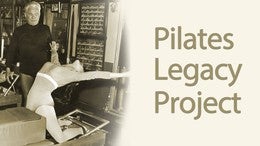
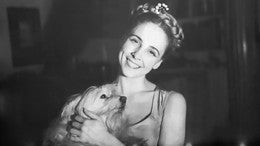
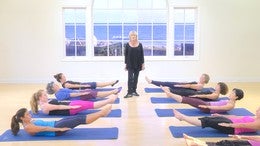
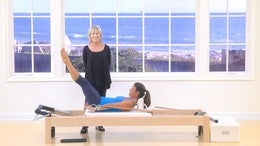
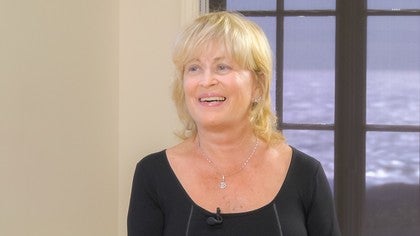
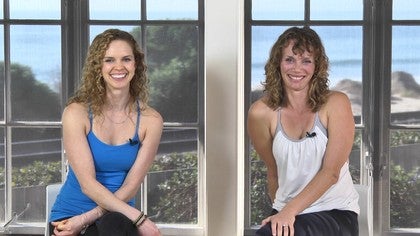
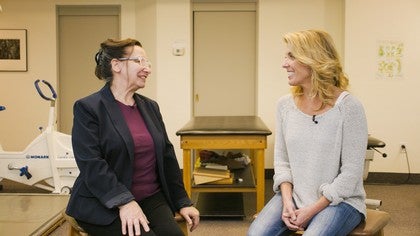





-60037.jpg)


















